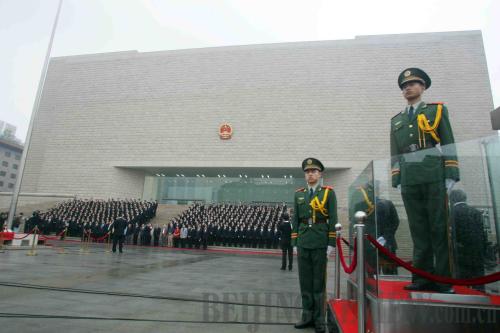|
 |
|
UPHOLDING PEOPLE'S RIGHTS: The photo shows the Higher People's Court of Beijing. In 2009, China's courts tried a total of 1,531 cases where citizens applied for state compensation (CFP) |
China's National People's Congress (NPC), the top legislature, recently adopted amendments to the Law on State Compensation, granting citizens greater power to obtain compensation when their rights are violated by the state.
The amendments, adopted on April 29 and effective December 1, were ratified at the end of a four-day bimonthly session of the NPC Standing Committee.
NPC Standing Committee Chairman Wu Bangguo, who presided over the closing of the session, said the amendments to the Law on State Compensation will regulate the use of public power, and protect the legitimate rights and interests of citizens, legal persons and social organizations. The original law, which took effect on January 1, 1995, was seen by many as a significant protection of human rights at the time.
And while the previous law covered infringements upon the lawful rights and interests of citizens, legal persons and other organizations, providing them with compensation should state organs illegally abuse their functions and powers, the language of the new amendments has been changed from "illegally abuse" to "excise" to expand the scope of cases entitled to state compensation.
Zhang Gang, a lawyer at the Beijing-based law firm Haodong who represented clients in state compensation cases, told Xinhua News Agency that officials sometimes refuse to compensate harmed parties as granting compensation is seen as admission of having violated the law.
Professor Ma Huaide from the China University of Political Science and Law sat on the board of experts drafting the law. He told Xinhua that in reality there were cases where citizens' rights were violated by state organ's lawful acts and couldn't obtain compensation for their losses. The amendments, he said, eliminate this obstacle for plaintiffs to be compensated.
The amendments also include compensation for psychological trauma for the first time. The amended law says, "When the victim suffers from psychological damage, relevant bodies should alleviate the effect, restore the reputation and offer an apology to the victim; when the consequences are serious, the victim is entitled to psychological damage compensation." But the amendments do not specify compensation standards for psychological damage. Related experts suggest including detailed standards in judicial interpretations drafted in the future.
Many lawyers in China say state compensation lawsuits are difficult because of complicated procedures. Last year, the nation's courts tried a total of 1,531 cases where citizens applied for state compensation. Only one third received compensation.
The current law stipulates victims should first apply for state compensation through the state body liable for compensation, which would then verify the facts.
Professor Jiang Anming from the Law School of Peking University said that in reality some organs liable for compensation used various excuses to refuse to verify the facts or delay the application procedures, making the verification process a significant obstacle to citizens' application for state compensation.
The amendments say when the state body liable for compensation fails to decide on whether to pay compensation within a certain period of time, the applicant can apply for administrative reconsideration at a higher level; if the applicant is not satisfied with the reconsideration, he or she can apply to the compensation commission of a people's court at the same level of the reconsideration body.
"This new regulation has increased citizens' channels for applying for compensation and guaranteed citizens' rights of relief," Wu Zeng, an official of the NPC Standing Committee's Legislative Affairs Commission, told Xinhua.
The revised law also specifies the respective burdens of proof of the compensation applicants and state body liable for compensation. It demands the body bear the burden of proof when the victim died or lost legal capacities during detention. Some members of the NPC Standing Committee said the new change is mainly to compensate victims for the inaction of some police officers at prisons and detention houses. This includes instances where officers witness the physical abuse of new detainees by other detainees but do nothing to prevent such occurrences.
"Such stipulations will make it possible for prosecutors to probe abnormal cases of inmate deaths, even when there is no convincing evidence," Xu Yongjun, a prosecutor at the People's Procuratorate in Beijing's Haidian District, told Xinhua.
Clauses have also been added to ensure that those entitled are timely and sufficiently compensated. The revised law stipulates that when the body liable for compensation is making decisions on compensation, it should fully consider suggestions of the applicants and could consult with them on ways, items and amount of the compensation.
The revised law specifies compensation payment procedures to ensure that the victim can receive the money no later than 22 days after he or she hands over the effective verdict or mediation agreement to the organ liable for the compensation. The previous law stipulates that if the property of the victim has been sold by auction, the proceeds of the auction shall be returned. The new law adds that if the auction proceeds are obviously lower than the actual value of the property, the difference should also be paid. The new law also requires the liable body to return the fines and confiscated and expropriated property to victims, as well as the equivalent to interests of bank deposits for the same period of time.
Nursing expenses and rehabilitation expenses have also been introduced as items of state compensation for those suffering from physical injuries. | 